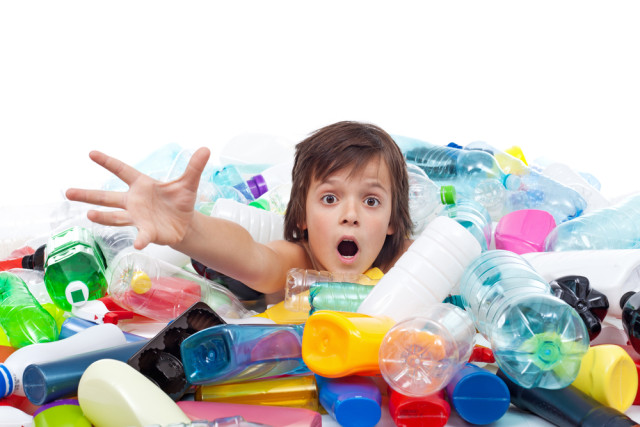
We all know plastic is bad for the environment.
But a group of chemicals added to plastic can impact human health…especially children’s brains. They’re called phthalates.
I talked to Green Diva Meg about recent research on the subject in this GD Health & Beauty episode. Listen up then read on for more information…
LISTEN:
Phthalates are found in hundreds of plastic products like rubber duckies, beach balls, plastic raincoats, plastic food containers (including the prepackaged foods in markets). They act as carriers for fragrances in products like laundry detergents, fabric softeners, soaps and shampoos as well as your favorite cologne or perfume.
Phthalates are also in cosmetics. They keep your mascara from running, stop your nail polish from chipping and help perfume linger.
Scientists have shown that they’re a probable human carcinogen as well as endocrine disruptors–gender-bender chemicals that make girls develop earlier and reduce testosterone levels in boys. They affect behavior too. One study from Environmental Health Perspectives found that prenatal exposure to phthalates caused an increase in ADHD behavior in children aged 4-9.
Health Care Without Harm, an umbrella organization of dozens of environmental and health groups, lab-tested 72 cosmetics by major brands such as Revlon, Calvin Klein, Christian Dior and Procter & Gamble and found phthalates in 52 of their products. 
The cosmetics companies insist that the small amounts they use are completely harmless.
But it’s impossible to know how much you’re being exposed to because you’ll never see the word phthalate listed on a label.
Phthalates, along with many other chemicals, do not have to be named on the label because of a loophole in legislation designed to protect the commercial or “trade secrets” of manufacturers.
Secret ingredients are often listed under the catch phrase “other,” or “inert,” for example, and could be extremely hazardous to your health. Vinyl chloride used to be considered “inert” and withheld from labeling until an epidemic of cancers spread through the plants using VC in the aerosols used in beauty parlors in the late 1960s. Also, if you see the word “parfum” know this word is an FDA-approved catch-all word that is synonymous with hidden phthalates.
A new study from a team of Columbia University and CDC researchers showed that when pregnant women were exposed to high levels of phthalates, their babies had lower IQ scores when they were tested in school…about six points lower, than the children who had low level exposure in the womb.
Bottom line: avoid fragrances whenever possible, and use glass or metal containers instead of plastic.
Please check out our YouTube channel to see short, funny and useful 1 GD Minute videos with recipes and DIY tutorials. Here’s a recent one…
And if you want to learn more about the content of this video, please read the corresponding post!
[dynamic-sidebar id=’Custom Widget 2′]
Pingback: What Are Plastics Doing to Our Childrens Brains | Care2 Healthy Living